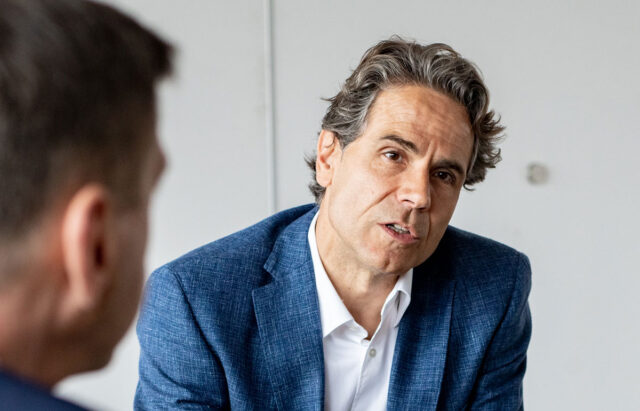We think and act in a holistic and sustainable manner. After all, every raw material that is processed has a value that it does not lose when it is made into a product. On the contrary: because our planet’s resources are limited, raw materials are becoming more valuable each day. For that reason we see it as our duty to preserve plastics by constantly feeding them back into efficient circular systems. We work on this circular economy each and every day – for our customers, to protect our environment and for the benefit of people who will still need a wide range of products for their daily lives in future.
This is why we are committed to:
We will be happy to speak to you about how we can work together to develop specific sustainable solutions:
We develop a tailor-made induction into the circular economy for each of our customers.
We set you on the path towards your tailor-made recycling concept by assessing the quantity and quality of the resources that arise as waste. For instance, we identify the most efficient options for reclaiming materials and then decide which of our affiliated companies would work best together to handle the processing through to the finished recyclate. We then develop the site-specific logistics solution to ensure that the process is set in motion with no disruptions. After the concept has been approved by our customer, we introduce it into the company’s processes. We provide consultancy and training as a reliable partner and use quality controls, feedback meetings and fine-tuning to ensure that the induction into the circular economy is a success.
Interview with Gisbert Schulte-Bücker
‘Linear production processes that consume high levels of resources have had their day – the future belongs to the circular economy.’
Mr Schulte-Bücker, what is the current state of play in terms of the circular economy for plastics?
We are absolutely on the right track. The potential is huge. Of the some 50 million tonnes of plastics processed across the EU each year, around 30 million tonnes end up as waste. Germany itself is home to around a quarter of European plastics production. This makes us an important role model in terms of further expanding circular solutions. Decisive factors for the future will be the interaction and the cross-acceptance of different technologies such as mechanical materials recycling and chemical recycling. Similarly, the thermal recovery of multi-component plastic waste will continue to play an important role for the foreseeable future.

In your view, what are the most important influencing factors for the transformation we need of what are mostly still linear production processes?
At the top of the list I’d mention the understanding in the minds of many operators and decision-makers – and also of consumers – that we need to end the wasteful handling of our raw materials. Whether this understanding emanates from human reason or the impetus from legislators and the public, I wouldn’t like to judge. The main factor is, at least this is our impression, that it is increasingly gaining broader traction. In day-to-day practice we need to be open to all ecologically relevant technologies. However, mechanical recycling remains the most important pillar because it is the most efficient method of waste recycling in terms of energy and resources. Beyond its limitations, the various approaches to chemical recycling of primarily mixed plastic waste will be a key component of a burgeoning circular economy in future.
Which factor is the most important in terms of plastics recycling?
Quality. Plastics recycling stands or falls on the quality of the results. The more exactly the recyclates match the required properties, the more they will be used in the manufacture of new product. This quality always starts with a separation according to type as far as possible. And it continues with high-tech processing – in conjunction with our experienced, expert staff, without whom we would be unable to drive forward our plans for the future.
What do you say to those who are critical of plastics?
Our criticism shouldn’t be aimed at plastic as a material, but rather at how we’ve been using it for decades. And that’s currently changing significantly. Plastic will always be indispensable in many areas of our life, e.g. in medicine, mobility or food packaging. Our job is to think every raw-material cycle through to the very end in conceptual terms and then to implement it consistently.
What does that mean in concrete terms?
A cycle always begins at the start of the process, i.e. at the very conception of the product, when recycling should also be considered as a key component in the product life cycle. All market participants then take on new roles: what is currently the end consumer becomes the temporary user, and the digital waste economy no longer recycles, but thinks and acts as a raw-material producer of the 21st century. This is the right step forward into the future.
Thank you.